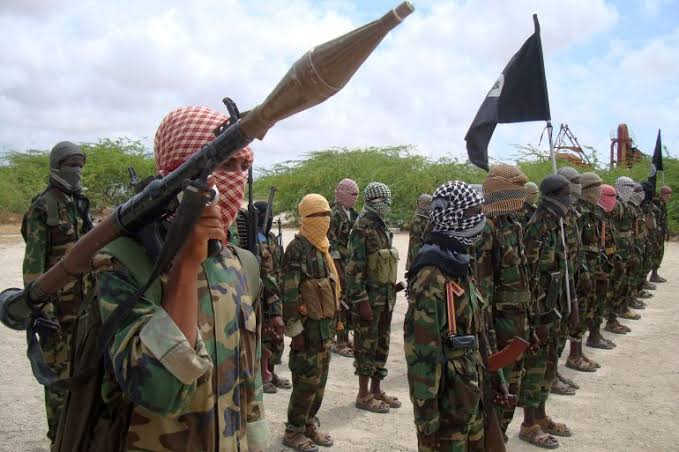The al-Shabab rebels in Somalia has reportedly seized a United Nations helicopter carrying nine passengers—capturing six crew members and leaving one dead on Wednesday—are part of a Sunni Islamist militant group that’s linked to the Sunni militant group al-Qaida and funded by Iran, just like the key militant groups in the Middle East that threaten to expand that crisis beyond a regional war.
Al-Shabab rebels seized the U.N. helicopter after it was forced to make an emergency landing in territory controlled by the al-Qaida-linked militant group, multiple outlets reported, capturing six passengers and killing one more as two managed to escape.
Al-Shabab set the helicopter on fire after capturing it in central Somalia, where the UN’s African Union Transition Mission in Somalia provides support for more than 19,000 peacekeeping forces.
It was reported that the helicopter was carrying medical supplies and had intended to carry injured soldiers out of Somalia’s Galgaduud region.
The reason why the helicopter—which was headed to the Somali town of Wisil—was forced to make an emergency landing, has not yet been determined.
Some reports said it had been forced to make an emergency landing, while others said the landing was a mistake.
Al-Shabab controls large parts of southern and central Somalia.
The group is affiliated to al-Qaeda and has waged a brutal insurgency for nearly 20 years.
The seizure of the helicopter was confirmed by Galmudug region Security Minister Mohamed Abdi Adan.
Several foreigners and two locals were on the helicopter, Somali military official Major Hassan Ali said.
“It was also carrying medical supplies and it was supposed to transport injured soldiers from Galgudud region,” he was quoted as saying.
The helicopter was heading to Wisil town near the frontlines of an offensive against al-Shabab by government forces when it landed.
The UN’s World Food Programme (WFP) posted on social media on Wednesday night that the aircraft was “not a WFP or UN Humanitarian Air Service craft and no WFP personnel were aboard”.
The WFP added that as a precaution its flights in the area had been temporarily suspended.
The Somali government has in recent months intensified its fight against the al-Qaeda-linked group.
Al-Shabab, a Sunni Islamist militant group designated a terrorist group by the U.S. and many other countries, controls large swaths of central and southern Somalia, in the Horn of Africa, where the group has been engaged in a deadly insurgency for power of the country for nearly two decades.
Al-Shabab has an estimated 10,000 fighters in Somalia, and has claimed responsibility for a string of bombings in Somalia, including an attack last February that killed 10 people, with al-Shabab saying it targeted Somali military officials.
Al-Shabab is also believed to be responsible for a 2017 suicide bombing attack in the capital city of Mogadishu that killed more than 500 people, and also took credit for a deadly attack in September 2013, when four masked gunmen opened fire in a shopping center in Nairobi, Kenya, killing nearly 70 people and wounding more than 200 more.
In 2014, it claimed responsibility for a suicide bombing at a restaurant in neighboring Djibouti that was reportedly popular with westerners in Djibouti, and in 2015, the group took credit for an attack at Garissa University in Kenya that killed nearly 150 university students, reportedly targeting Christian students.
U.S. Army General Stephen Townsend also told the Senate Armed Forces Committee in 2022 that Al-Shabab is the “largest, wealthiest and most lethal al Qaida affiliate in the world,” and the “greatest threat to U.S. persons and interests in” East Africa.
The group became well known in the international stage in 2006, initially seen as a resistance group to Ethiopia’s military invasion, with al-Shabab capitalizing on anti-Ethiopian sentiment to recruit fighters and garner support. al-Shabab held the majority of south and central Somalia from the mid-2000s until it withdrew from Mogadishu in 2012, when Somali forces wrested control of the capital. The State Department designated the group a foreign terrorist organization in 2008, blocking financial support to the group and calling al-Shabab “one of al-Qaida’s most dangerous affiliates” that has “killed thousands of people, including Americans.” U.S. military forces have also been providing training and advice for Somali special forces, an enemy of al-Shabab that has been engaged in a campaign against the militant group.
Iran-backed militant groups are also playing an increasing role in the Middle East, following Hamas’ Oct. 7 attack on Israel and Israel’s ongoing war in the Gaza Strip, prompting fears from U.S. officials of a wider conflict. Hamas, Yemen’s Houthi rebels and Lebanon’s Hezbollah are all major recipients of Iran’s funding and backing. Iran-backed Houthi rebels are continuing attacks in the Red Sea, and Hezbollah has carried out multiple attacks on Israel while the Israel Defense Forces launched multiple strikes in Lebanon, killing a top Hamas official last week outside Beirut, as well as a senior Hezbollah commander.
